Everything you need to know about German food, including typical recipes, favorite meals, the tastiest snacks and more.

German food is some of the most delicious food in the world, and it has been so much fun cooking German recipes!
But, as our guest says, “there is more to German food than pretzels and bratwurst.” And she is so right!
Sophie from Dirndlkitchen.com grew up in Germany, moved to the USA, and now runs a German food blog. She shares her love of German cooking with the world!
We sat down with Sophie on IGTV to talk about everything German food, including the best and worst foods, typical meals, the tastiest snacks, and more. Check out the interview transcription below and make sure to leave a comment telling us your favorite German dish!
How did you get started with your blog?
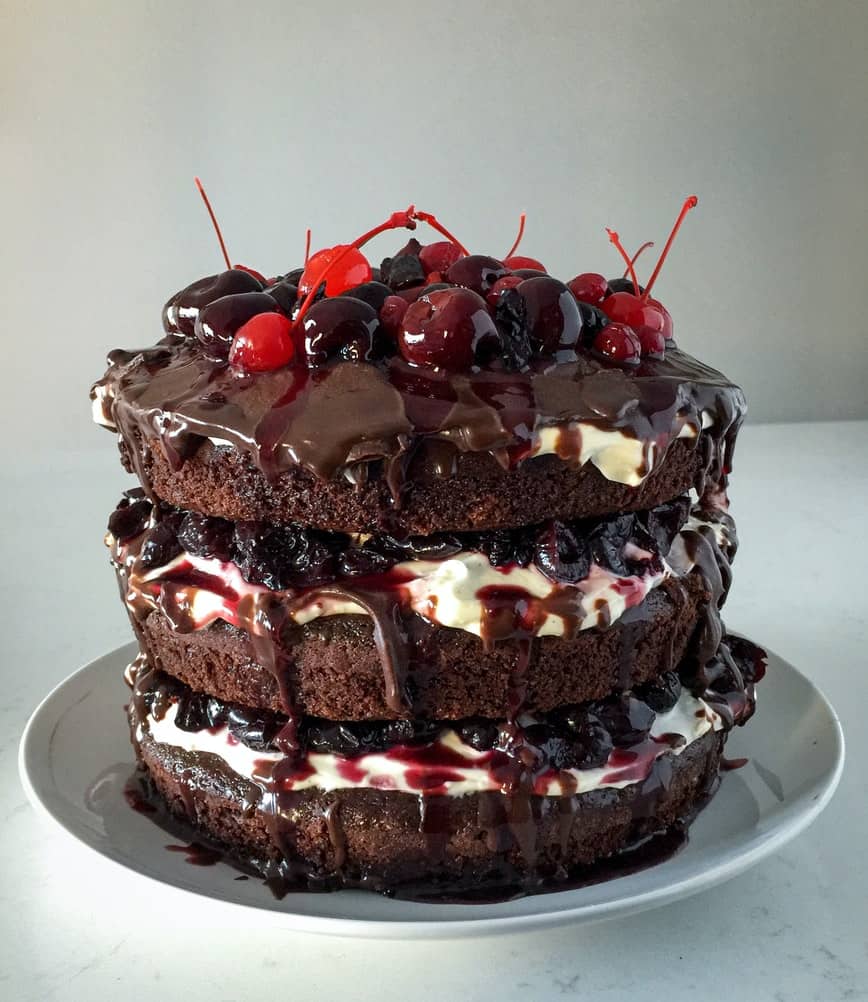
I’m from Germany originally, and I actually moved to the US in 2009 after being an exchange student in high school for a year. I ended up moving back here (USA) and went to college here. The whole time, I just missed Germany so much that I had to find a way to connect back to it in a regular way.
I wanted to find a way to reconnect to my German roots, so I started my blog, Dirndl Kitchen, in 2015. Since then, I have been writing about German food and my experiences growing up in Germany, and tying it all together with food.
I feel like food, as you probably agree, is one of the easiest ways to learn culture. Because you don’t have to know a language… you just try the food!
I think it’s really important for Americans to learn about German food because not everything in German food is just pretzels and Bratwurst. I think a lot of Americans just don’t know much more than that when it comes to German food.
So I set out on a mission to teach them more about German food, and I have over 200 German recipes on my blog already!
What was life like growing up in Germany? Tell us about a typical American childhood vs a typical German childhood.

The longer I’ve lived in America (it’s been almost 12 years!), the less obvious the differences seem to me.
When I first moved here, it was a total culture shock. I didn’t even understand the American language because I grew up learning the British accent, so I had to get used to the American accent! Now I’m over those hurdles… I’m almost more Americanized.
It’s kind of a stereotype but I do think in general Germans come across as being more rude than Americans. Here, when you walk into a store, everyone greets you at the door and asks you how you are. In Germany, that would never happen.
When it comes to German restaurants, the service is not as on top of things as in America. Even the whole structure of how waitresses get paid is so different, too!
In Germany they get paid minimum wage with a little tip on top of it. In America they make way below minimum wage and then it’s up to the customer to make sure that they get a livable wage.
All of these concepts are so different… even down to how much space you have. Everything in Germany is so tight and so much smaller. Then you come to the US and everything from stores, to parking spaces, streets, cars, even intersections… everything is so much bigger here! It’s such a different way of life.
As for my childhood, I remember spending afternoons at my grandparent’s house. They would always cook lunch for us because grade school ended around 12-1 pm in Germany, and we’d have the whole afternoon to do homework and figure out what to do with other kids.
We’d go to my grandparents’ house and they would always be cooking a lot, so that’s really how I learned about German cooking and baking. My grandma would always make cakes in the afternoon, and we’d have the famous Kaffee und kuchen, which is afternoon cake and coffee (also an Austrian tradition). Almost like a German tea-time!
I actually recently started a TikTok, that points out some differences between American life and German life. Hopefully everybody thinks it’s funny.
Germany shares a border with many other countries (9 to be exact). Does this have an effect on the food of the country?
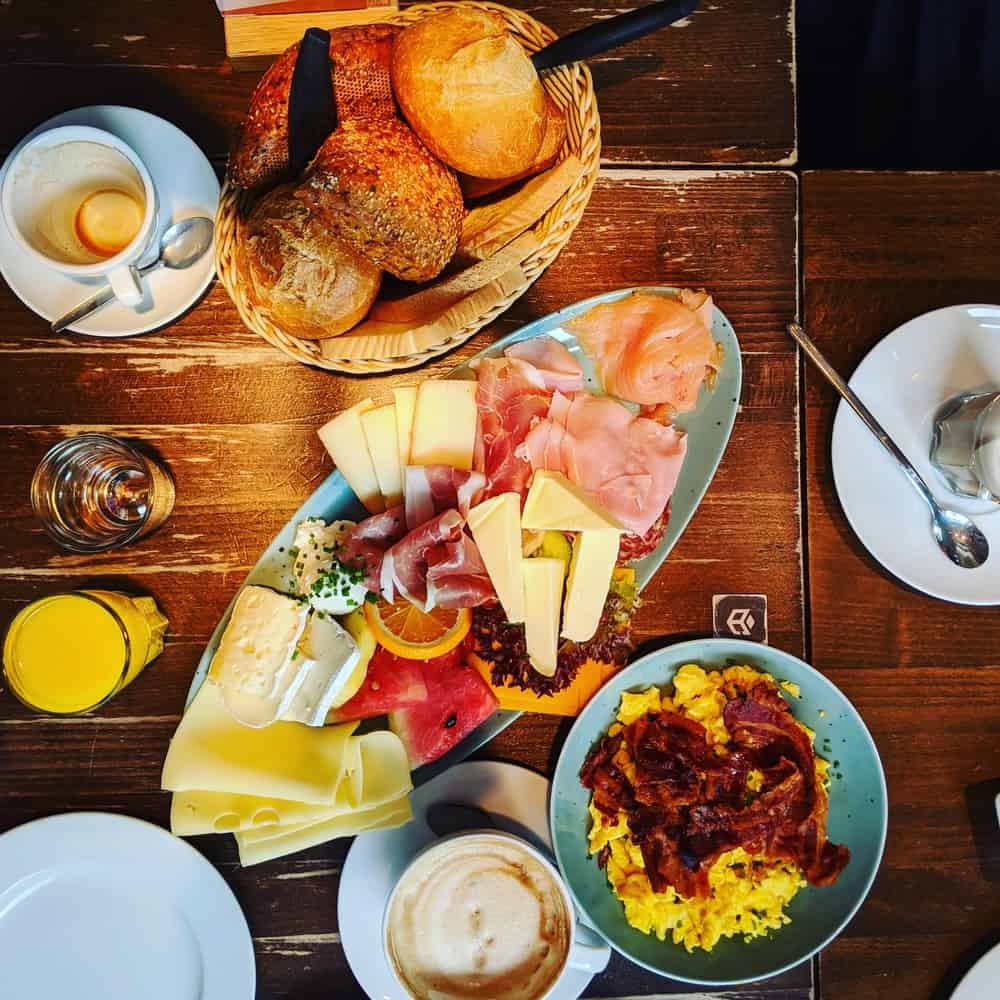
It’s really hard to just put German food in one bucket because there’s so many different regions and so many different specialties.
There’s actually 16 states within Germany, and each of the states is kind of proud of what they do (and then you get Bavaria, which is kind of like the Texas of the US… southern and uber proud). It’s funny how different things are in Germany and how proud different states are of what they do.
I think one of the main influences, though, is Turkish food. Turkish people are the largest immigrant group in Germany, so you get a lot of authentic (and sometimes less authentic) Turkish food.
One of the most famous German fast foods is actually Turkish, it’s called Döner. It was invented in Berlin, Germany but by Turkish people. It’s like a pita pocket and is similar to gyro meat, where they shave it off of the rotator grill but it’s seasoned differently.
Then they put the meat with a bunch of different vegetables and a creamy garlicky sauce. I actually have a recipe for that on my blog and it’s one of my very favorite things to make here because I miss it so much.
My dad actually lives just across the border from France so he will go to a French bakery every morning but then he literally can walk across the border in 2 minutes, so it’s very interesting.
Walk me through a typical day of German eating.
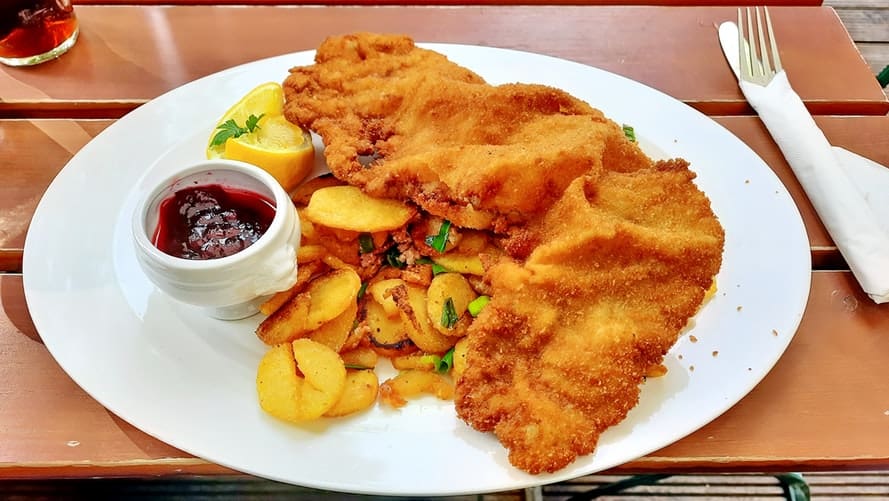
The day starts off with a big breakfast, with rolls and meats and cheeses. You, of course, have nutella on the breakfast table as well as boiled eggs — and that’s a medium boiled egg with a slightly runny yolk (it has to be perfect or my family will be very upset). Germans drink so much coffee, so there’s normally lots of coffee for breakfast too.
A traditional lunch in Germany would be a warm lunch, though my parents have kind of gotten away from that… sometimes we’ll just have a sandwich for lunch and have a warm dinner. The warm lunches are the traditional German foods you would normally think of, like Rouladen, Eintopf (one pot stew), and those kinds of things.
If you were growing up traditionally in Germany, you would have a cold dinner. That would include sliced bread with meats and cheeses, what you would typically think of as “lunch” in the US. That meal is usually called Abendbrot, which translates to “evening bread”. It’s very simple.
Usually at some point you have a glass of wine or a beer.
In the afternoon, you have your kaffee und kuchen (coffee and cake), which is a really good tradition. It’s usually more celebrated on the weekend than during the weekday.
During the weekday, people might just have a cup of coffee and a little pastry or something like that. But in the afternoons on Sundays, you usually make a cake or fresh waffles with Rote Grütze (a berry sauce) that you pour over the waffles with fresh whipped cream.
What are your thoughts on the sugar content in German desserts vs American desserts? It seems like German desserts are far less sweet than American desserts.
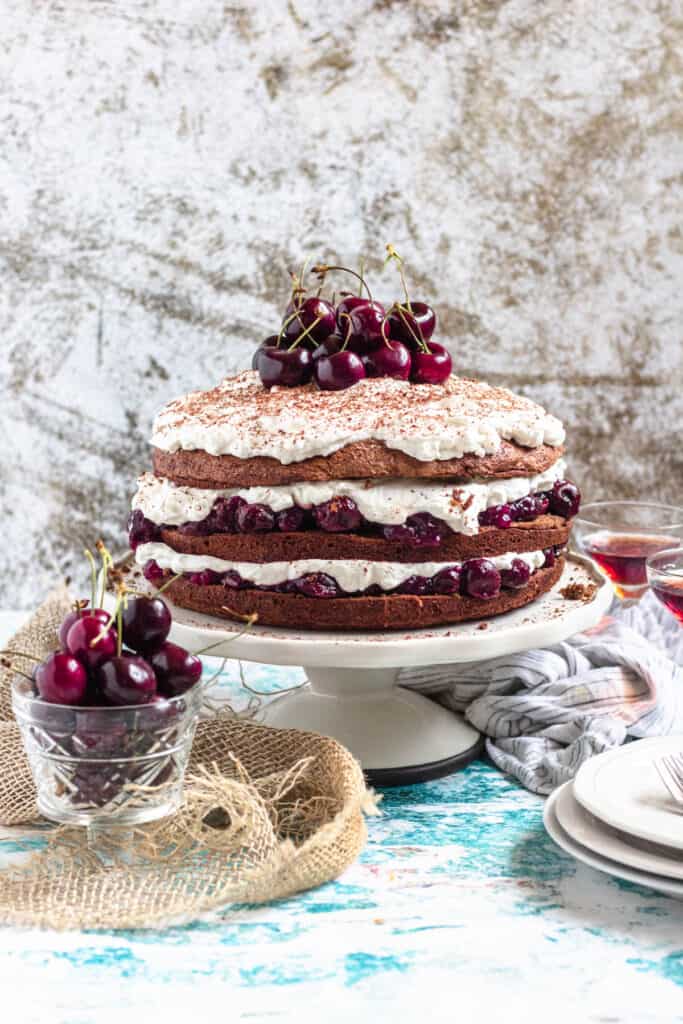
First of all, the proportions of cake to frosting here are just crazy here! When I bake something, it’s normally not as sweet, so it still kind of shocks me when I have an American dessert. Even ice cream seems sweeter and denser here, too.
I’ll eat all desserts though, I’ll never turn down dessert. Try this German Black Forest Cake Recipe for a great German dessert!
What is beer culture like in Germany?

Obviously beer drinking is very popular in Germany. Where I come from is actually wine country in Germany, so people drink wine as much as they drink beer there. I would walk through vineyards coming home from school.
My favorite German beers are probably pilsner or lager, but I also love a good Radler (which is beer mixed with Sprite). You can also buy Colabier (which is beer mixed with Coke).
One of my favorite things I grew up drinking (and I say “grew up” because the drinking age in Germany is 16) is banana juice and wheat beer.
It may sound a little gross, but it’s actually really good. Typically Bananenweizen beer will have banana notes in it, so the banana juice actually compliments it. It’s nothing fancy, but it’s just something that the kids would drink.
Is there anything eaten in Germany that’s not eaten anywhere else in the world?
I mean, I would say Brötchen is at the top of that list, just because rolls for breakfast are kind of specific to Germany, and there’s such a large variety. Somewhere I read that Germany has the largest variety of baked goods in the world, so when I go to Germany that’s one of the first things I crave.
Every bakery has their speciality, so you have to go to all of them. You’ll never be disappointed because they all have a good selection. The smaller ones are better than the chains of course. They’re harder to find these days, but try all the rolls and all the pastries. Those are what I miss the most.
When I visited Germany, I fell in LOVE with Kinder, specifically Kinder Hippos. What is your favorite snack from Germany?
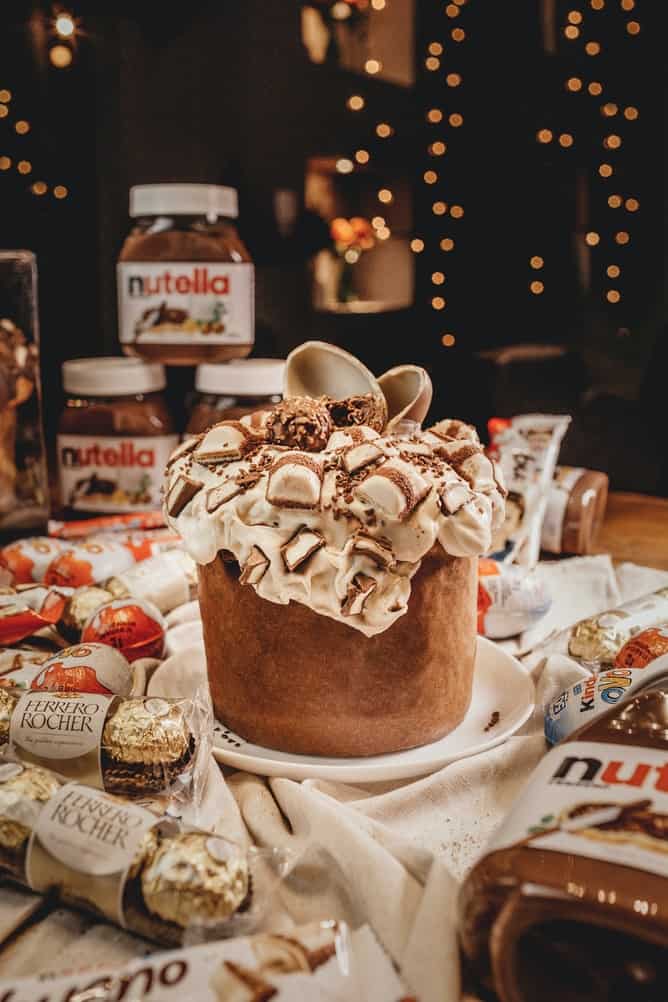
So generally speaking, I must say, snacking is not as big of a thing in Germany as it is here. Growing up, I would only have snacks at my grandma’s house, and that’s because your grandparents give you whatever you want.
When we snack it’s because we play board games on the evenings or weekends, and that’s when a lot of the snacks come out… even chips!
My favorite are Nic Nacs, which are peanuts in a crunchy, seasoned shell that’s so good. Milka chocolate isn’t as available in the US, but I love that, too.
What is your least favorite German food?
I can’t stand anything that’s gamey. My grandfather was a hunter, so he’d take us to his tree stands, where he’d feed the animals.
I grew up around that and they’d bring home wild boar and deer to cook, and I’ve just never been a fan of that.
Are sausages (wurst) as popular in Germany as Americans think they are?
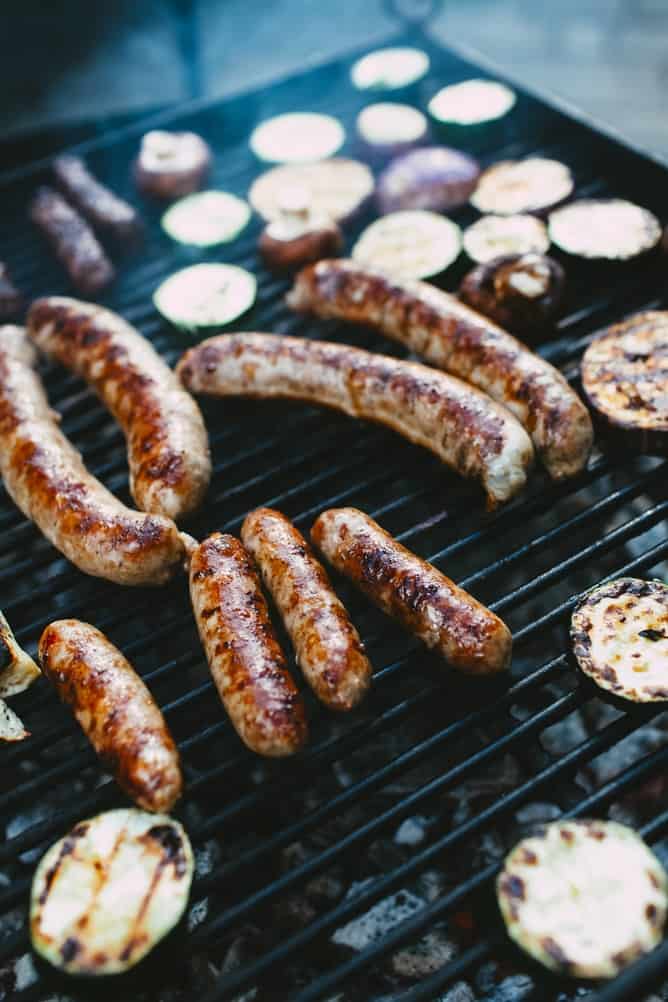
I’m a sucker for anything with cheese, but I love a good amount of cheese inside of my sausage… especially when it oozes out when you cut it open.
In the summertime, grilling is a huge thing and a lot of times there will be some Bratwurst on the grill, but we also grill other things. It’s not just bratwurst all day, every day because it’s not the healthiest meat.
A lot of times we have kebabs with marinated chicken and veggies. We also like grilled Schwenkbraten which is a specialty out of the Saarland region (it’s a pork cutlet marinated with onions and spices).
You marinate it for a whole day and then grill it, and it’s delicious. The marinade breaks down some of the fibers in the meat so it makes it a lot more tender.
Currywurst, sausage with a curry sauce, is also popular. You wouldn’t think curry is something German, but currywurst is very German. They have TONS of currywurst stands in Berlin.
Thank you so much, Sophie, for the fun chat! You can find more information on Germany on this website as well as recipes for some of the best German specialties, including:



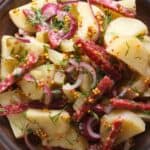


Leave a Reply